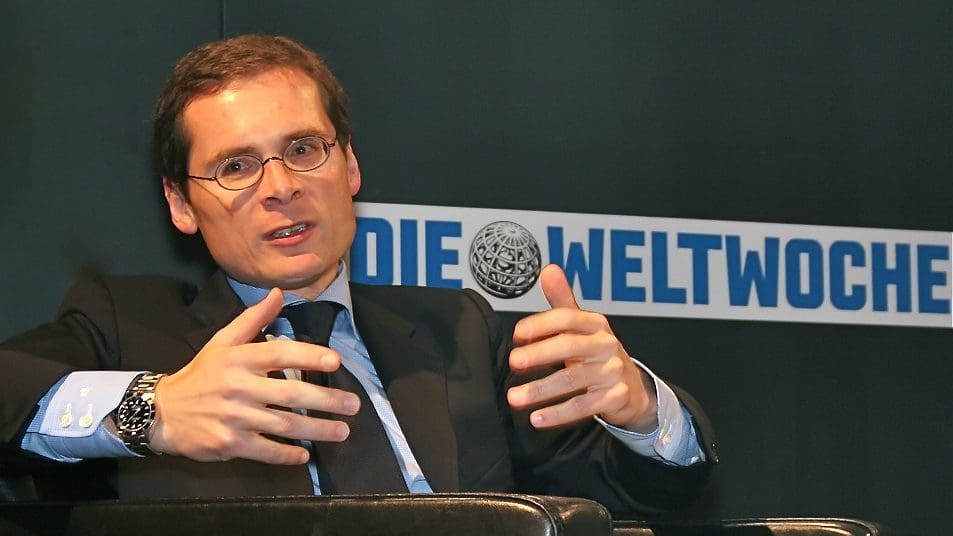Both Prime Minister’s political director Balázs Orbán and state secretary for international communication Zoltán Kovács have highlighted on their respective social media accounts a long commentary by publisher and chief editor of the prestigious Swiss weekly Die Weltwoche, Roger Köppel. In the 8 August article, titled Viktor Orbán’s Big Speech in Dallas Mr. Köppel praised prime minister Orbán’s Texas CPAC speech. Mr. Köppel even chose to publish the Orbán speech in its entirety in the magazine, stating that he considers it ‘important.’
Clearly, this – positive commentaries about the Hungarian PM and full transcripts of his remarks being published – hardly ever happens in the Western European media, where Orbán is regularly labelled with the epithets ‘autocratic leader’ and ‘far-right prime minister.’ As Roger Köppel himself noted in his commentary, ‘most European media outlets couldn’t relate to Orbán’s speech. The Frankfurter Allgemeine spoke disparagingly of “war rhetoric”. Other German newspapers dismissed Hungary’s prime minister as a “leading figure in the fight against liberalism”. Even the NZZ doesn’t think much of the “EU outsider” Orbán, who is celebrated by “like-minded people like a hero”.’ Roger Köppel, in a heartening exception to the rule, sympathizes with what Orbán said in his speech. The Swiss chief editor described Orbán’s performance in Dallas as ‘outstanding’ and stressed that the Hungarian PM was ‘Confident and humorous’ and ’pleaded for the values of the West: Christianity, freedom, traditional family, low taxes.’ In another gesture of sympathy, Mr. Köppel chose the quote from Orbán’s remarks ‘I’m an old-fashioned freedom-fighter’ as the title of the speech’s transcript. It is important to add that this is not the first time Die Weltwoche has endorsed Orbán: in 2015, the magazine featured an exclusive interview with the Hungarian premier and its front page carried the headline Viktor Orbán: The Defender of Europe.
The Swiss chief editor described Orbán’s performance in Dallas as ‘outstanding’
The unusually friendly coverage begs the question: who is Roger Köppel, and why the positive attitude towards the Hungarian premier’s ideas and policies?
Well, similarly to Orbán, Köppel is also commonly described as a ‘radical right-wing politician’. Also, like Orbán, he has been referred to as a ‘far-right thinker.’ If we stick to the facts, he is a publisher as well as a politician, affiliated with the Swiss People’s Party (SVP). In 2015 and 2019 he was elected to the National Council on the SVP’s list of the Canton of Zurich, with a commanding majority of votes. He is also a member of the Foreign Policy Committee of the National Council.
Yet Mr. Köppel, a journalist, publicist and entrepreneur, is somewhat of a political novice. As he himself said, he joined a political party (SVP) for the first time in his life in 2015, when he also ran for office, after having worked extensively and successfully in journalism for decades. When he was appointed the chief editor of the Die Weltwoche the first time, in 2001, he redesigned the publication to replace the broadsheet by a magazine format. It was under his brief first tenure that the magazine was repositioned as neoliberal and right-wing conservative, and adopted an editorial stance supporting the SVP. This did not go down well with the publishers at the time, so, apparently for declining sales of the paper, he was let go in 2003. He then was hired as chief editor by the renowned German newspaper Die Welt. It was in this capacity that he acquired fame outside journalistic circles, when Amer Cheema, a Pakistani Islamist who claimed wanted to assassinate Köppel, was caught by security guards in the lobby of the paper’s publisher, Axel Springer’s headquarters in Berlin in 2006. Köppel became a target because under his leadership, the editorial board had decided to reprint the famous (or infamous?) Charlie Hebdo Muhammad cartoons earlier that year.
‘Moderate immigration makes sense, but not the mass immigration that prevails today’
But let us look at how Köppel describes himself and his political credo in his own words. ‘I am for Switzerland’s independence and against creeping EU accession. We must remain open to the world and must not become blindly attached to Europe. Moderate immigration makes sense, but not the mass immigration that prevails today, be it legal or illegal. Our model for success is called direct democracy; I oppose any dismantling of people’s rights.’
Very clear words. Mr. Köppel is obviously not enthralled by the prevailing European ideology that supports mass immigration. He is all for keeping Switzerland Swiss, and not in a racial, but cultural sense. He cares for his country’s sovereignty and independence, and is working to preserve the unique and admirable feature of the Swiss political system, direct democracy.
As far as his personal life is concerned, Mr. Köppel is married to Bich-Tien Köppel, a Zurich-born former financial executive of Asian extraction who is now the full-time mother of four children.
All of this is astonishing for some, remarkable for those who appreciate Orbán and who appreciated his Dallas speech. Roger Köppel falls into the latter category, and, considering his life and career, it is not difficult to understand why.







